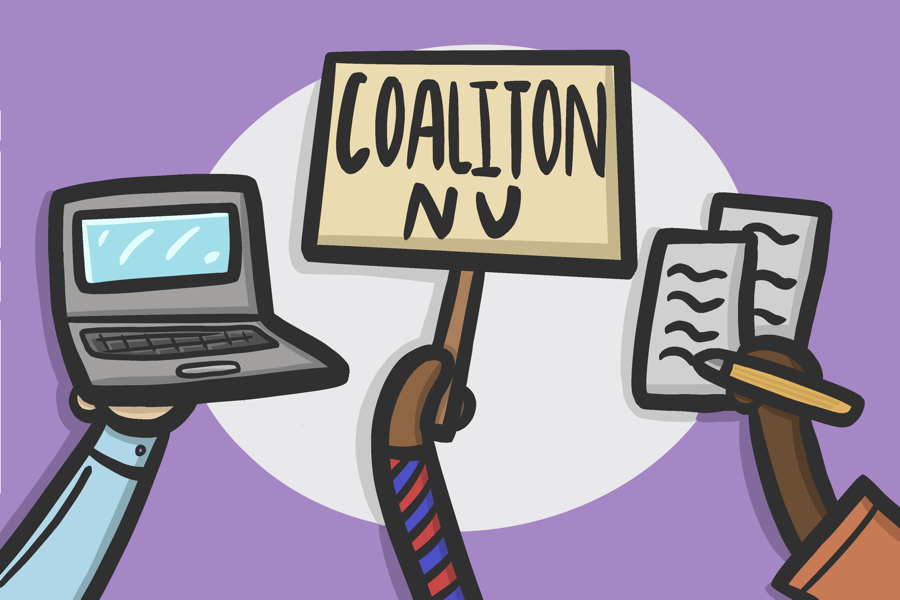CoalitionNU emphasizes collective action and existing demands while reflecting on past year of organizing
Illustration by Nathanial Ortiz
CoalitionNU’s demands have largely stayed the same since the pandemic began. It has also shifted focus to abolition work.
April 19, 2021
For the past year, graduate students have met with University administrators to demand Northwestern prioritize students with marginalized identities. The administration has largely responded with hesitancy, according to some students.
Sarah Peko-Spicer, an organizer of CoalitionNU and Ph.D. candidate, said the collective has demanded inclusive healthcare, increased funding for affinity spaces and other support systems after a year of pandemic mobilization and appeals to the University.
“I personally am rethinking if this is an effective pathway to be working down,” she said. “Are we just wasting everyone’s time sitting in these meetings?”
Still, Peko-Spicer said she hopes a projected return to campus may rejuvenate organizers after a difficult year where the graduate students’ academic and life responsibilities were exacerbated, particularly for caregiving students and those of marginalized identities.
In Fall 2019, members of The Graduate School affinity groups began meeting to consider collective action after sharing frustrations with leadership, forming CoalitionNU. One of their efforts resulted in an anonymous March letter to administrators, calling for the removal of Teresa Woodruff, former TGS dean. They also urged University leadership to prioritize the wellbeing of students of marginalized identities through funding, space provision, childcare and more.
“TGS is responsible for cultivating an accessible and equitable environment that values diverse backgrounds,” the letter stated. “Under Dean Woodruff’s leadership, TGS has fallen short of these goals and, in so doing, has harmed the underrepresented communities they have pledged to support.”
Since then, at least one demand has been realized — Woodruff left Northwestern at the end of the 2019-20 academic year. The group has since held regular meetings with Interim Graduate School Dean Kelly Mayo, Peko-Spicer said.
CoalitionNU’s demands have largely stayed the same since the pandemic began, Peko-Spicer said.
Peko-Spicer emphasized that the coalition prioritizes advocating for University support of Indigenous graduate students, like by designating an outdoor space in the Chicago Campus for land-based spiritual practices.
In addition, the University has failed to prioritize mental health of graduate students, Peko-Spicer said. Along with advocating for inclusive insurance coverage, CoalitionNU is still pushing for the hiring of more mental health counselors for the Graduate School community and expanding the list of referrals to therapists. The group has also been trying to internally prioritize the well-being of its members in the last year.
Ph.D. candidate Erique Zhang said the coalition’s demands shifted to include police abolition and supporting NU Community Not Cops and undergraduate activist organizations. Many of the coalition’s members helped draft a June 2020 petition calling for the abolition of University and Evanston police and for investment in life-giving practices for Black students, they said.
“I do actually think a lot of the organizing has shifted to focus on abolition,” Zhang said. I think that’s good… at this point, that’s where our priorities are lying.”
Ph.D. candidate Andrew Hull, unity committee chair and former co-chair of Northwestern University Graduate Workers, said the group often collaborates with the coalition.
Many NUGW and CoalitionNU members overlap. Both are united in their goals, Hull said, and NUGW has incorporated the collective’s demands into its own letters to the University.
“(Coalition work) puts fantastic pressure on the administration itself,” Hull said. “I think just as importantly, it reveals to other graduate workers just how much power we have when we work together.“
Their collaboration also shows that graduate students are not alone in their struggles, Hull added.
CoalitionNU’s organizers have a lot of responsibilities beyond the collective that contribute to these struggles, Peko-Spicer said. The group’s organizers are currently writing dissertations, looking for jobs and completing other graduate tasks.
Still, Peko-Spicer said she is able to see that CoalitionNU is really a collaborative effort. Through organizing in the past year, she saw other activist groups on campus share visions of what the University could become. This convergence, she said, showed her the power of collective organizing.
“One of our organizations on its own is something that the University can fight and stop,” Peko-Spicer said. “But when we continue to build out and build up together, I think that’s going to be an unstoppable force.”
Email: yunkyokim2022@u.northwestern.edu
Twitter: @YunkyoMoonK
Related Stories:
— A year into pandemic, NUGW is still advocating for sixth-year funding
— Committee opens communication between TGS students and administration
— Graduate students demand removal of TGS dean Teresa Woodruff in letter



